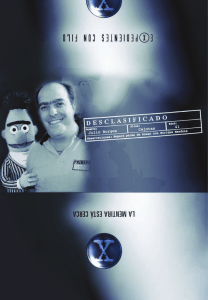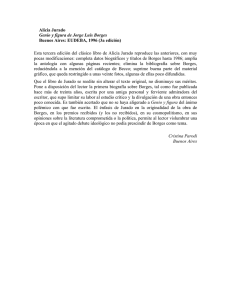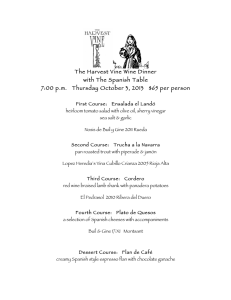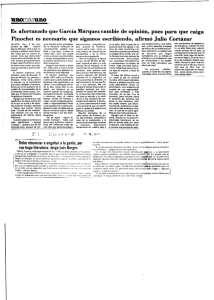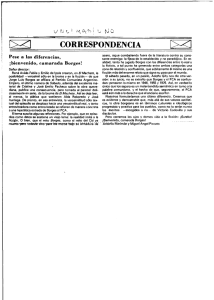Argentine and Latin American Literature
Anuncio
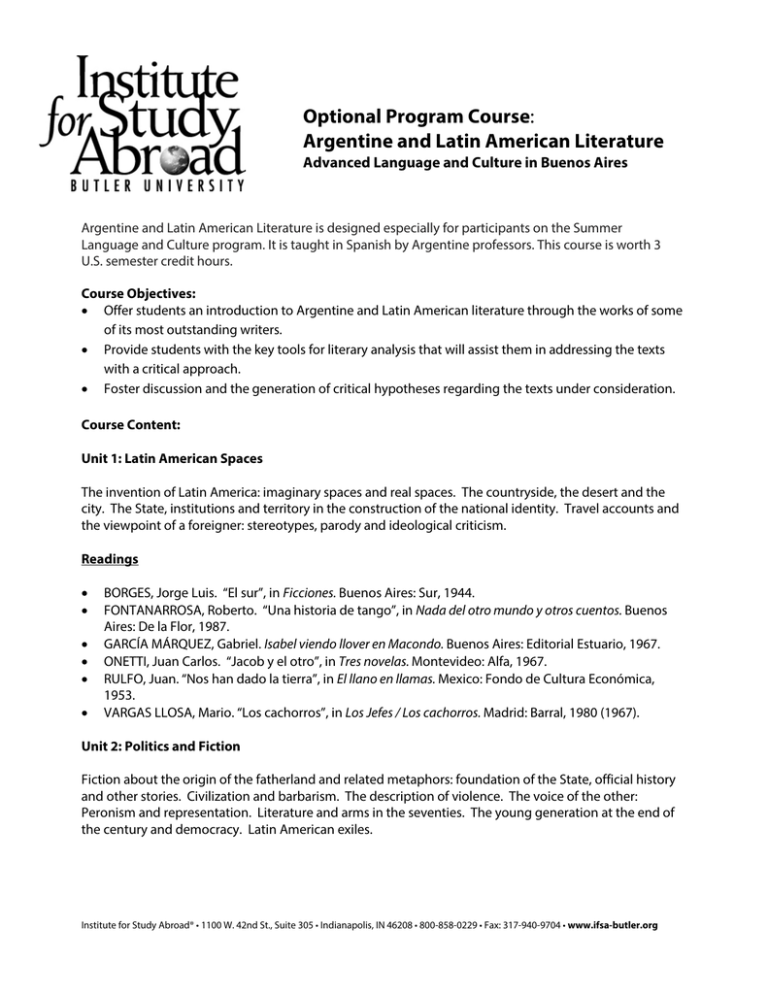
Optional Program Course: Argentine and Latin American Literature Advanced Language and Culture in Buenos Aires Argentine and Latin American Literature is designed especially for participants on the Summer Language and Culture program. It is taught in Spanish by Argentine professors. This course is worth 3 U.S. semester credit hours. Course Objectives: • Offer students an introduction to Argentine and Latin American literature through the works of some of its most outstanding writers. • Provide students with the key tools for literary analysis that will assist them in addressing the texts with a critical approach. • Foster discussion and the generation of critical hypotheses regarding the texts under consideration. Course Content: Unit 1: Latin American Spaces The invention of Latin America: imaginary spaces and real spaces. The countryside, the desert and the city. The State, institutions and territory in the construction of the national identity. Travel accounts and the viewpoint of a foreigner: stereotypes, parody and ideological criticism. Readings • • • • • • BORGES, Jorge Luis. “El sur”, in Ficciones. Buenos Aires: Sur, 1944. FONTANARROSA, Roberto. “Una historia de tango”, in Nada del otro mundo y otros cuentos. Buenos Aires: De la Flor, 1987. GARCÍA MÁRQUEZ, Gabriel. Isabel viendo llover en Macondo. Buenos Aires: Editorial Estuario, 1967. ONETTI, Juan Carlos. “Jacob y el otro”, in Tres novelas. Montevideo: Alfa, 1967. RULFO, Juan. “Nos han dado la tierra”, in El llano en llamas. Mexico: Fondo de Cultura Económica, 1953. VARGAS LLOSA, Mario. “Los cachorros”, in Los Jefes / Los cachorros. Madrid: Barral, 1980 (1967). Unit 2: Politics and Fiction Fiction about the origin of the fatherland and related metaphors: foundation of the State, official history and other stories. Civilization and barbarism. The description of violence. The voice of the other: Peronism and representation. Literature and arms in the seventies. The young generation at the end of the century and democracy. Latin American exiles. Institute for Study Abroad® • 1100 W. 42nd St., Suite 305 • Indianapolis, IN 46208 • 800-858-0229 • Fax: 317-940-9704 • www.ifsa-butler.org Readings • • • • • • • BOLAÑO, Roberto. “Ramírez Hoffman, el infame”, in La literatura nazi en América. Barcelona: Seix Barral, 1996. BORGES, Jorge Luis. “El simulacro”, in El Hacedor. Buenos Aires: Emecé, 1960. CORTÁZAR, Julio. “La banda”, in Final de juego. Buenos Aires: Sudamericana, 1956. REJTMAN, Martín. “Algunas cosas importantes para mi generación”, in Rapado. Buenos Aires: Planeta, 1992. REY ROSA, Rodrigo. “Negocio para el milenio”, in Ningún lugar sagrado. Barcelona: Seix Barral, 1998. ROZENMACHER, Germán: “Cabecita negra”, in Cabecita negra. Buenos Aires: De la Flor, 1997 (1962). WALSH, Rodolfo. “Esa mujer”, in Los oficios terrestres. Buenos Aires: Jorge Álvarez, 1965. Course Methodology: Classes will comprise two pedagogic instances: During the first part of the class, the professor will make a presentation of the subject, with a first approach to each text, considering the author’s production and the socio-cultural context. During the second part of the class, work groups will be formed (with 3 or 4 students in each group) to discuss texts according to the instructions received. At the end of the class, the groups will share the results they have obtained. In order to facilitate access to the reading material, the texts will be compiled in a booklet including reading guides prepared by the course professors. Evaluation: • • • Attendance, punctuality and active participation in class (30%); Written exam (30%). Essay on two texts worked on in class. Length: 4 pages, double spaced; Final written paper (40%). Comparative analysis of two of the texts included in the syllabus, at the student’s choice, addressing any of the topics discussed during the course. Length: 5 pages, double spaced. Bibliography: ALTAMIRANO, Carlos and SARLO, Beatriz. Ensayos argentinos: de Sarmiento a la vanguardia. Buenos Aires: Ariel, 1997. BALDERSTON, Daniel. Borges: realidades y simulacros. Buenos Aires: Biblos, 2000. BARRENECHEA, Ana María. La expresión de la irrealidad en la obra de Borges. Buenos Aires: CEAL, 1984. CORTÁZAR, Julio. “Del cuento breve y sus alrededores”, in Último round. Mexico: Siglo XXI, 1974. CORTÉS ROCCA, Paola and KOHAN, Martín. Imágenes de vida, relatos de muerte. Eva Perón: cuerpo y política. Rosario: Beatriz Viterbo, 1998. FUENTES, Carlos. “Rulfo, el tiempo y el mito”, in J. Rulfo, Toda la obra. Mexico: Archivos, 1992. GAMERRO, Carlos. El nacimiento de la literatura argentina. Buenos Aires: Norma, 2006. Institute for Study Abroad® • 1100 W. 42nd St., Suite 305 • Indianapolis, IN 46208 • 800-858-0229 • Fax: 317-940-9704 • www.ifsa-butler.org GILMAN, Claudia. Entre la pluma y el fusil. Debates y dilemas del escritor revolucionario en América Latina. Buenos Aires: Siglo XXI, 2003. KITRIK, Noé. “Forma y significación en El matadero de Esteban Echeverría”, in Suspender toda certeza. Antología crítica (1959-1976). Buenos Aires: Biblos, 1997. KRANIAUSKAS, John. “Rodolfo Walsh y Eva Perón”, in Nuevo Texto Crítico, Year VI, number 12/13, July 1993- June 1994. LINK, Daniel. “Rodolfo Walsh y la crisis de la literatura”, in Cómo se lee y otras intervenciones críticas. Buenos Aires: Norma, 2003. –––––––––––. Leyenda. Literatura argentina: cuatro cortes. Buenos Aires: Entropía, 2006. LUDMER, Josefina. Cien años de soledad. Una interpretación. Buenos Aires: Tiempo contemporáneo, 1972. MANZONI, Celina (editor). La fugitiva contemporaneidad. Narrativa latinoamericana 1990-2000. Buenos Aires: Corregidor, 2003. MOLLOY, Sylvia. Las letras de Borges y otros ensayos. Rosario: Beatriz Viterbo, 1999. MONSIVÁIS, Carlos. “Sí, tampoco los muertos retoñan, desgraciadamente”, in Juan Rulfo (comp.), Para cuando yo me ausente. México: Grijalbo, 1983. NAVARRO, Marysa (comp.). Evita. Mitos y representaciones. Buenos Aires: FCE, 2002. PANESI, Jorge. “Borges nacionalista”, in Críticas. Buenos Aires: Norma, 2000. PELLER, Diego. “Walsh con Masotta”, in Otra Parte, number 12, Spring 2007. PIGLIA, Ricardo. Crítica y ficción. Buenos Aires: Seix Barral, 2000. PRIETO, Martín. Breve historia de la literatura argentina. Buenos Aires: Aguilar, 2006. RAMA, Ángel. “Los procesos de transculturación en la narrativa latinoamericana” [1974], in La novela en América Latina. Panoramas 1920-1980. México: Universidad Veracruzana, Fundación Ángel Rama, 1986. ROSA, Nicolás. “Cortázar: los modos de la ficción” and “Cortázar o el engendramiento del lector”, in La letra argentina. Crítica 1970-2002. Buenos Aires: Santiago Arcos, 2003. RUFINELLI, Jorge. “Juan Rulfo”, prologue in Juan Rulfo, Obra completa. Caracas: Biblioteca Ayacucho, 1977. SARLO, Beatriz. Borges, un escritor en las orillas. Buenos Aires: Ariel, 1995. –––––––––––––. Escritos sobre literatura argentina. Buenos Aires: Siglo XX, 2007. –––––––––––––. La pasión y la excepción. Buenos Aires: Siglo XXI, 2003. SHUMWAY, Nicolás. La invención de la Argentina. Historia de una idea. Buenos Aires: Emecé 1993. VIÑAS, David. Literatura argentina y realidad política. Buenos Aires: CEAL, 1983. Institute for Study Abroad® • 1100 W. 42nd St., Suite 305 • Indianapolis, IN 46208 • 800-858-0229 • Fax: 317-940-9704 • www.ifsa-butler.org
